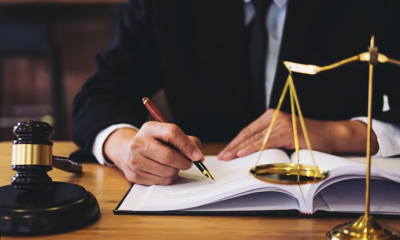Law
If Injured In Custody How Should You Proceed?

We are all familiar with the Miranda warning; that short speech police officers are said to make when making an arrest to ensure that the detainee knows all their rights while in police custody. The right to remain silent, the right to an attorney, so on and so forth. While the specifics of the warning may vary according to circumstances, despite the fairly uniform rendition on TV, it does underline a fundamental point in regards to being in custody: you still have rights. One of these rights is the protection from bodily harm.
So if you are injured while in custody, how should you proceed?
Establishing Liability
The first case in any lawsuit is working out who is responsible for your injury while in custody. This is crucial if you want the case to proceed in your favor, as you need to work out whom to take to court first. If the injury suffered was attained through the direct or indirect action of the local police department, then you can take them to court. So think very carefully: when were you injured, where did it happen, how did it happen, and who could reasonably have been responsible or prevented it?
You can sue for injuries suffered by inaction; it should be noted. In legalese, this is called negligence. So, for example, if you are given food while in police custody that later gives you food poisoning because it was improperly cooked, you can sue for negligence. Likewise, if the injury you’ve suffered gets worse because the police denied you access to medical assistance, you can again sue for negligence.
Another case where you may sue the police department is if you are injured by another inmate. The police officers should know who is in which cell, and how dangerous occupants within them are. If you’ve been detained for being drunk and disorderly and are placed next to someone who’s considered to be dangerous, the police are responsible for any damages you suffer. They have a responsibility not only to keep you detained for as long as you are in police custody, but also to keep you safe and in good health. Always keep that in mind.

Provide Proof
That is another crucial matter with lawsuits regardless of the nature of them. You need to be able to prove it was the other party who was responsible. For that, police departments are very useful depositories of evidence. As a matter of procedure, police departments must always keep extensive records of any interaction between them and a suspect held in their custody. This includes interrogations and interviews, and also frequently involves video recordings. Thus, if a police officer was directly responsible for your injury, such as by assaulting you, you can immediately provide physical evidence in court.
The presence of a lawyer within the police department while under arrest is also a crucial way to help strengthen a case, as they can provide legal advice and better represent you during questioning. You have the legal right to representation by an attorney – even if you cannot normally afford one, the state will provide you one at their expense. Always make sure that you have a lawyer present. The police cannot legally deny you access to one if you request their presence.
Accepting Responsibility
You must be honest here: did you in any way provoke the police into giving you the injury? Here you must think reasonably. You are under police custody, and they do have a responsibility to keep you restrained as well as protect themselves and other people within their care. Therefore, there are circumstances where you waive liability if you act incorrectly.
Specifically, if you try to forcibly escape custody, assault a police officer, or assault another person within your holding cell, and suffer bodily harm during the process, the court may decide to not hold up the case. You were directly responsible for that injury. It may proceed if the police used unreasonable force to keep you detained, such as by hitting you repeatedly with a baton even when you’ve been subdued, or else caused you unreasonable distress in the process or aftermath. However, you need to be able to provide extensive evidence if you expect the case to proceed.
If ever you are uncertain whether or not you do have a case against the police department, you can always seek legal advice. Many attorneys such as David Heil, P.A., offer their services as legal consultants, for a fee, and can quickly examine a case to see whether or not you have something strong enough to hold in court. They can also provide further advice on how to proceed with your case, whom to contact, and how you should pursue it. Should you have been provided a lawyer while in custody, they too can help oversee your legal rights and liberties, and help ensure you get all the legal help you need if you so require.
Christian Mills is a freelance writer with a specialty in law and legal matters, and strives to make sure his audience remembers their legal rights remain in effect regardless of where they are. If you wish to learn more about Christian you can visit on Google+.
-

 Tech11 years ago
Tech11 years agoCreating An e-Commerce Website
-

 Tech11 years ago
Tech11 years agoDesign Template Guidelines For Mobile Apps
-

 Business6 years ago
Business6 years agoWhat Is AdsSupply? A Comprehensive Review
-

 Business10 years ago
Business10 years agoThe Key Types Of Brochure Printing Services
-

 Tech8 years ago
Tech8 years agoWhen To Send Your Bulk Messages?
-

 Tech5 years ago
Tech5 years ago5 Link Building Strategies You Can Apply For Local SEO
-

 Law5 years ago
Law5 years agoHow Can A Divorce Lawyer Help You Get Through Divorce?
-

 Home Improvement6 years ago
Home Improvement6 years agoHоw tо Kеер Antѕ Out оf Yоur Kitсhеn









































